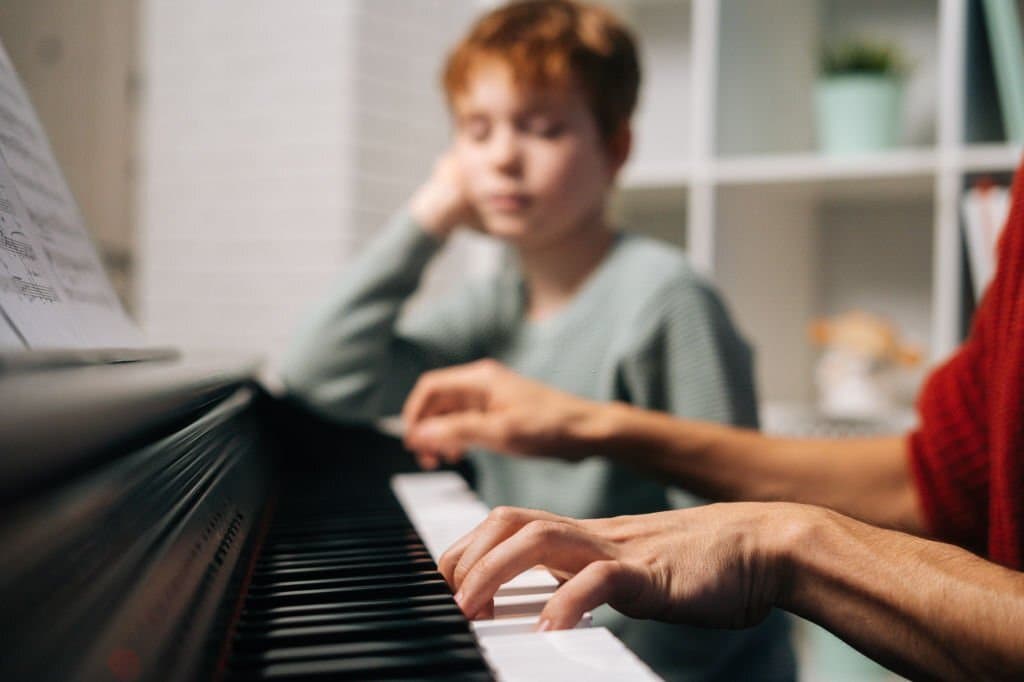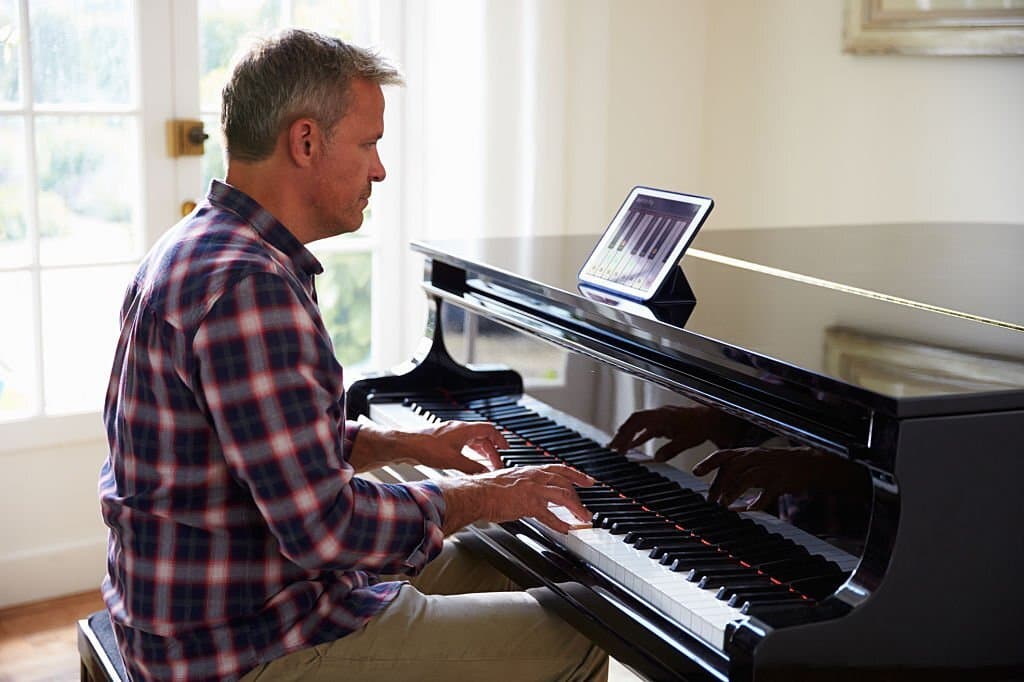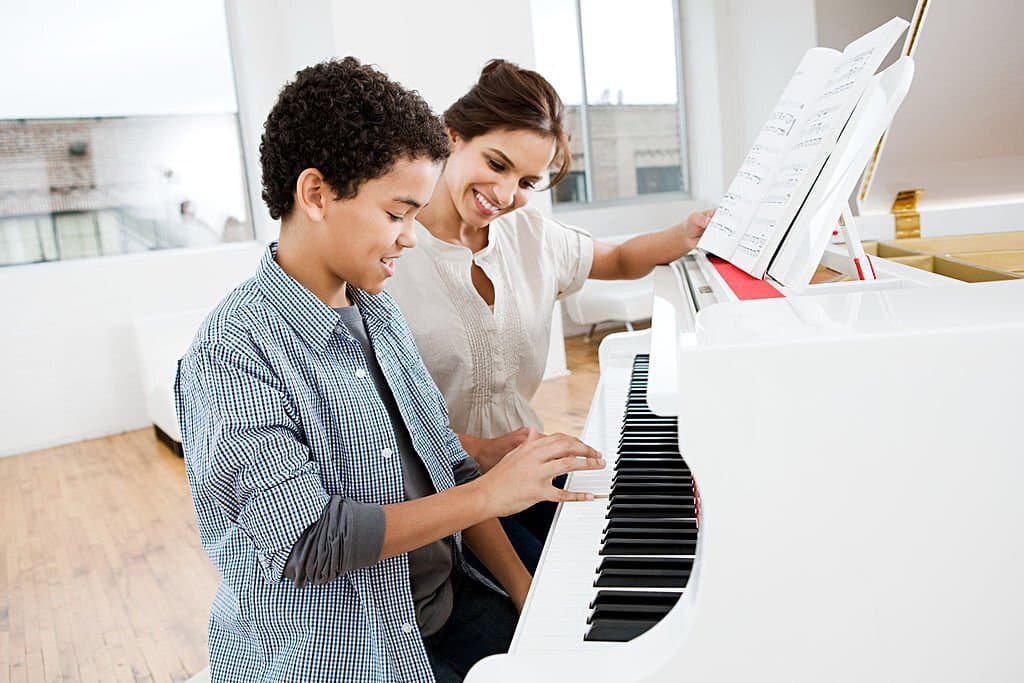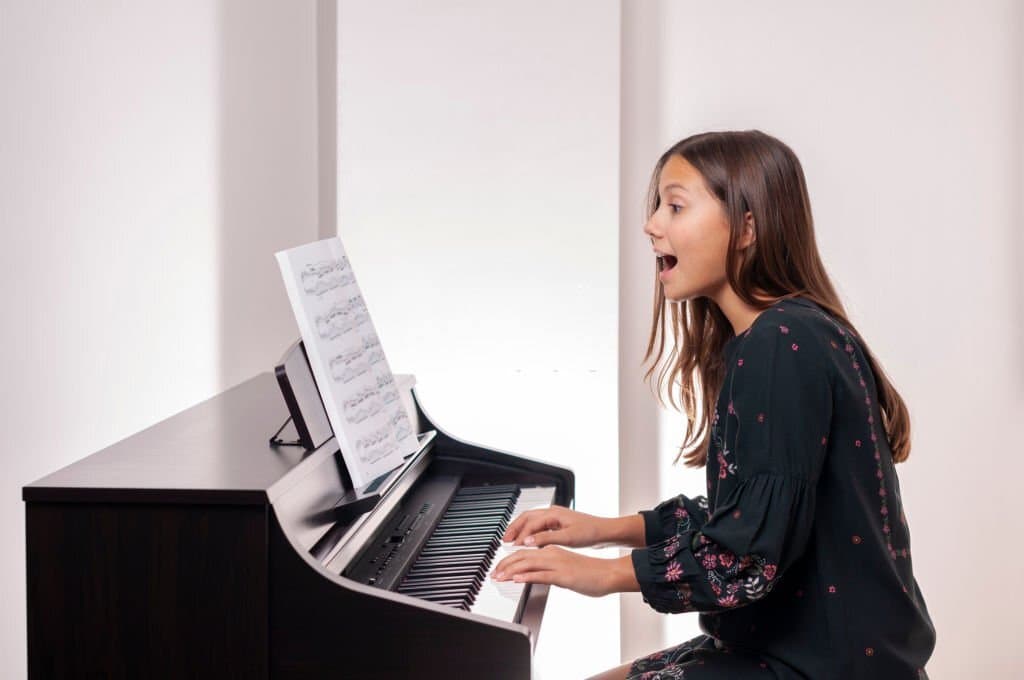How Long Does it Take to Learn Piano: A Comprehensive Guide
So you want to learn how to play the piano? That’s great! Piano is a fun and rewarding instrument to play. But how long does it take to learn piano? And what are the best ways to learn?
In this comprehensive guide, we will answer all of your questions about learning piano. We’ll discuss how long it takes on average to learn, the different methods that are available, and some tips for getting started. So whether you’re a complete beginner or you’ve been playing for years, read on for everything you need to know about learning piano!
Related: 13 Types Of Pianos and Their Uses
How long does it take to learn piano?

It really depends on how much time you’re willing to invest and how quickly you want to learn. If you’re taking lessons from a professional instructor, they’ll be able to give you a pretty good estimate based on your skill level and goals.
That being said, there’s no magic number when it comes to learning piano. Some people can pick it up relatively quickly while others might take a bit longer. The important thing is to enjoy the process and not get too discouraged if it takes you a little longer than you’d hoped.
Learning piano can be a great way to relax, relieve stress, and improve your overall mental wellbeing. So even if it takes you a bit longer than you initially anticipated, it’ll be worth it in the end!
Beginner level
Beginner level students can generally expect to complete the entire course in 12-24 months.
After that, it will take another year or two of practice to achieve an advanced level.
But those with some prior knowledge or experience may be able to reach an intermediate level within six to twelve months.
Of course, everyone is different and some students may learn more quickly or slowly than others.
But these estimates should give you a general idea of the time commitment required to learn piano.
Intermediate level.
In order to advance to the next level, you must pass a test or complete an assignment.
In order to be considered an intermediate pianist, you must have passed the beginner level and be able to play some basic pieces. The amount of time it takes to learn piano at the intermediate level depends on how much practice you put in, but it usually takes around one to two years.
Advanced level.
Reaching an advanced level of piano playing can take years, even decades. But don’t be discouraged – the journey is just as rewarding as the destination. The sense of accomplishment you’ll feel when you finally play that difficult piece you’ve been working on for months (or even years) will be worth all the effort.
It can take up to five years to become proficient at the advanced level. The beginner level can be mastered in as little as six months with regular practice.
Professional level.
It can take up to five years to become a professional-level pianist. However, many people are able to play simple songs within a few months. The amount of time it takes to learn piano depends on your skill level, practice habits, and the type of music you want to learn.
If you’re just starting out, you can expect to spend at least a few months learning the basics. If you want to play classical music, it will take longer to learn than if you’re only interested in pop songs. However, regardless of the genre, regular practice is essential to improve your skills and reach your goals.
There are different opinions on how long it takes to reach a certain level of proficiency on the piano. However, most people agree that it takes a significant amount of time and dedication to become a master of the instrument.
How many levels are there in piano playing?
There are 10 levels in piano playing. The first level is learning the notes on the keyboard and how to play basic chords.
The next level is learning songs. The third level is learning how to read music. The fourth level is understanding musical theory. The fifth level is mastering techniques such as trills and tremolos.
The sixth level is learning about different styles of music. The seventh level is mastering difficult pieces. The eighth level is learning to play by ear. The ninth level is teaching others how to play the piano and the tenth and final level is composing your own music.
Related: G Major Chord Piano – How To Learn and Play G Chord on Piano
No Experience
If you have never played the piano before, it will take longer to learn than if you have some experience. A good rule of thumb is that it takes about two years to really become proficient. However, this is just a general guideline and your mileage may vary.
Level Prep A. The very basics
If you are brand new to the piano, it will probably take you around one year to become proficient at playing basic tunes.
During this first year, it is important that you practice every day for at least 30 minutes.
Level Prep B. Moving on up
Once you have a handle on the basics, you can start to learn more difficult pieces.
This will take some time and effort, but with practice you should be able to play intermediate-level music within two years.
If you want to play advanced music, it could take four or more years of practice.
Level 1A. Playing for fun
If you are taking lessons and practicing regularly, you should be able to play simple songs within a few months.
You will probably never get tired of playing your favorite tunes over and over again.
And as you continue to improve, you can start learning more difficult pieces.
Level 1B. Playing in public
Once you have mastered the basics, playing in front of an audience can be a lot of fun.
You may feel nervous at first, but with practice you will get better and more confident.
Level 2. Playing in a band
If you want to join a band, you will need to be able to read music and play by ear.
This takes time and practice, but it is definitely doable with the right instruction.
Level 3. Composing music
If you want to compose your own music, it will take a lot of practice and dedication.
But with patience and hard work, you can create beautiful pieces that others will enjoy playing.
Level 4. Becoming a professional
If you want to make a living playing the piano, you will need to be extremely talented and dedicated.
It takes years of practice and performing to reach this level, but it is definitely possible if you have the passion and drive.
Level 5. Teaching others
If you want to teach others how to play the piano, you will need to be proficient at every level.
This means mastering basic skills, as well as learning more difficult pieces and compositions.
It also requires understanding different teaching methods and strategies.
Level 6. Playing other instruments
If you want to play other instruments, it will take time and practice.
But with dedication and hard work, you can become proficient at any musical instrument that you choose.
Level 7. Music theory
If you want to understand music theory, it will take time and effort.
But with the right instruction, you can learn everything from scales and intervals to chord progressions and harmonic analysis.
Level 8. Ear training
If you want to develop your ear training, it will take time and practice.
But with the right instruction, you can learn how to identify intervals, chords, and melodies by ear.
Level 9. Piano pedagogy
If you want to become a piano teacher, you will need to know how to teach piano.
This involves understanding different teaching methods and strategies, as well as knowing how to adapt your lessons to fit each student’s needs.
Level 10. Conducting
If you want to conduct an orchestra, you will need to be proficient in music theory and ear training.
You will also need to know how to lead a group of musicians and get them to play together.
Conducting is a complex skill that takes years of practice and experience to master.
What level piano is Fur Elise?
Fur Elise is written for the intermediate player. It is considered a moderately difficult piece to play. There are many different variations of Fur Elise, so it is important to find the right level that fits your playing ability. If you are a beginner, you may want to start with a simpler version of this song.
How long does it take to teach yourself the piano?
It really depends on how much time you want to devote to learning and practicing the instrument. A person with no prior experience playing piano can expect to spend at least a few months regular practice before starting to see real progress. However, if you’re already experienced with another musical instrument, you may be able to learn the basics of piano in as little as a few weeks.
The biggest factor in how long it takes to learn piano is how frequently you practice. If you can devote an hour or more each day to learning the instrument, you’ll progress much faster than someone who only practices for a half-hour once or twice a week.
Additionally, your natural aptitude for music will play a role in how quickly you learn piano. If you have perfect pitch or are able to easily pick up new melodies, you’ll find that learning the piano comes more naturally than it does for those who don’t have these abilities.
Of course, even if you’re not a ‘natural’ musician, that doesn’t mean you can’t learn to play the piano. It will just take a bit longer and require more practice.
In short, learning to play the piano generally takes between several months and a year for most people, but it can vary depending on your individual abilities and how much time you’re able to devote to practice.
How much does it take to master a song?
This is a question that has been asked by many people who are interested in learning how to play the piano. The answer, of course, depends on the person. Some may take longer than others to learn how to play fluently. However, with enough practice and dedication, anyone can learn to play the piano. In fact, there are many resources available to help you learn, such as online tutorials and YouTube videos.
The amount of time it takes to learn piano also depends on the type of music you want to play. If you are interested in classical music, for instance, then you will need to learn how to read sheet music and master a wide range of chords and melodies. On the other hand, if you are more interested in contemporary music, then you can focus on learning how to play by ear and improvise.
No matter what your goals are, there are a few things you should keep in mind when learning how to play the piano. First, be patient with yourself and don’t expect to become a pro overnight. It takes time and practice to get better. Second, make sure you set aside enough time each day to practice. If you can devote at least 30 minutes a day to practicing, you will progress much faster than if you only practice once a week.
Finally, find a teacher or instructor who can help guide you along the way and give you feedback on your playing. A good teacher will help you identify your strengths and weaknesses, and give you tips on how to improve. With the right guidance, anyone can learn to play the piano, regardless of how long it takes.
Is piano hard to learn?
The answer to this question largely depends on your prior experience with music and how much time you are willing to dedicate to learning the instrument. Generally speaking, most people can start playing simple tunes within a few months of consistent practice. However, becoming proficient at piano takes years of dedicated study. There is no one definitive answer to this question. It really varies depending on the person.
One of the great things about piano is that it can be learned at any age. Children often progress faster than adults, but this is not always the case. Adults who have some prior experience with music may pick up piano more quickly than those who have never played an instrument before. The important thing is to be patient and consistent with your practice.
How long does it take to learn piano technique?

This is a difficult question to answer, as it depends on a number of factors, including the individual’s natural ability, previous experience with other instruments, and how much time they are willing to devote to practice. However, most people can expect to spend at least several months acquiring the basic skills necessary to play piano proficiently.
Those who already have some experience with music may be able to learn more quickly, as they will already have a basic understanding of concepts such as rhythm and melody. However, even complete beginners can make significant progress in a relatively short period of time by working hard and practicing regularly.
In general, the more time you are willing to devote to practice, the faster you will learn. But even if you can only practice for a limited amount of time each day, you can still make significant progress if you are dedicated and motivated.
It is important to keep in mind that learning piano is a gradual process; there are no shortcuts to becoming an accomplished player.
Can you learn piano in a year?
In a word, yes. You can definitely learn how to play piano in one year or less if you put your mind to it and use the right resources. However, depending on your skill level when you start out, it may take more or less time than that. The best way to find out is to simply get started with learning the basics.
If you want to learn piano fast, the best way to do it is to find a good teacher who can give you customized lessons and help you progress at your own pace. There are also online courses that can be helpful, but make sure to find one that has good reviews and offers a money-back guarantee in case you’re not satisfied.
In addition to taking lessons, you should also be practicing at home on a regular basis. How much you need to practice will depend on how quickly you want to learn and how much time you can dedicate to it each day or week. But even if you can only practice for 30 minutes per day, that’s still better than nothing.
One other thing to keep in mind is that learning to play piano takes time and practice, but it’s definitely a skill worth having. So don’t get discouraged if you don’t see progress right away – Rome wasn’t built in a day, and neither will your piano skills be!
Can I learn piano at 30?

Absolutely! In fact, age 30 is a great time to learn piano. You’re old enough to have developed some patience and discipline, but young enough that you won’t get bogged down by the complexities of the instrument. Plus, learning piano can help keep your mind sharp as you age. So if you’re interested in taking up piano at 30, go for it!
How long does it take to learn piano if you’re starting from scratch?
If you’re starting from scratch, it will probably take you between six and 12 months to develop a basic understanding of the instrument. This includes being able to play simple songs, identify notes and keys, and understand basic music theory.
If you’re already familiar with another instrument, such as the guitar, it will probably take you less time to learn piano. Depending on your level of skill and experience, you could be playing basic songs within a few weeks or months.
At what age is it too late to learn piano?
It’s never too late to learn piano! In fact, there are many famous pianists who started playing later in life. Some notable examples include: Vladimir Horowitz (started at age six), Art Tatum (started at age four), and Glenn Gould (started at age fifteen). So if you’re a beginner, don’t be discouraged – you can still achieve great things!
How much time should you practice?
This is a difficult question to answer, as it depends on so many factors (e.g. how frequently you take lessons, how much natural ability you have, etc). However, a good rule of thumb is to practice for at least 30 minutes every day.
How Long Does It Take To Learn Piano for Adults?
The simple answer is that it depends on how much time you are willing to devote to learning. A general rule of thumb is that it takes about two to three years for an adult beginner to reach a level where they can play most pieces with some confidence. However, this will vary depending on factors such as how often you practice, whether you take lessons, and how quickly you learn.
If you are an adult beginner who is just starting out, it is important to be patient and realistic in your expectations. It takes time to develop the skills necessary to play piano well. However, with dedication and practice, you can reach your goals and become a proficient pianist.
How Long Does It Take To Learn Piano for Children?

In general, it takes children longer to learn an instrument than adults. This is because they are still developing their fine motor skills and have shorter attention spans. However, every child is different and some may pick up the piano faster than others. The best way to find out is by enrolling them in piano lessons and seeing how they progress.
Can a 2 year old play piano?
This is a question that often plagues parents who are considering piano lessons for their young child. The answer, unfortunately, is not as simple as a yes or no. There are a number of factors that play into how quickly a child can learn piano, including:
-their age
-their level of interest
-the amount of time they are willing to practice
-their natural aptitude for music
While there is no definitive answer to the question of how long it takes to learn piano, we can look at some general guidelines to get a better idea. For most children, it will take somewhere between two and five years to reach a basic level of proficiency. This means that they will be able to play some basic melodies and chords, and have a basic understanding of music theory.
Related: Is Your Child Ready for Piano Lessons? – What Age is Right?
Is learning piano by ear hard?
In a word, no. It is not hard to learn piano by ear. In fact, it can be quite easy and fun! With just a little dedication and patience, you can start picking up the basics in no time at all. And once you have gotten the hang of things, playing by ear will become second nature to you.
How long does it take to learn music by ear?
It depends on your natural ability and how much time you practice each day. Most people can learn the basics of music within a year, but it will take many years to master playing by ear. There are also many different ways to learn music, so find the method that works best for you and stick with it! Practice makes perfect!
Is it better to learn piano by ear?
There is no one definitive answer to this question. Some people may be able to learn piano by ear more quickly than others, but everyone will eventually need to learn how to read music in order to play classical pieces or songs with more complex melodies.
There are many different ways to learn how to play the piano, and the amount of time it will take to learn will depend on the method you use, your natural ability, and how often you practice.
How long does it take to learn a song on a piano?

The answer to this question is not as simple as one might think. Depending on the person’s level of experience, it could take days, weeks, or even months to learn a new song. However, there are some methods that can speed up the process.
One method is to find a tutorial online that covers the song you want to learn. These can be found for free on websites like YouTube. Another method is to purchase a songbook that includes the sheet music for the song you want to learn. This way, you can follow along with the music as you play.
If you are a complete beginner, it is recommended that you start with simple songs that only have a few notes. As you progress, you can add more complicated songs to your repertoire.
It is important to practice regularly if you want to improve your piano skills. The more time you spend practicing, the faster you will learn new songs.
In general, it takes about six months of regular practice to become an intermediate player. And it takes around two years of regular practice to become an advanced player.
But remember, everyone learns at a different pace, so don’t get discouraged if it takes you longer than expected to learn a new song. Just keep practicing and you will eventually get there.
Related: Top 10 Easy Piano Songs
Conclusion
Now that we’ve looked at all the factors involved in learning piano, we can answer the question: how long does it take to learn piano? The answer, of course, is that it depends. It depends on your goals, your starting point, and your level of commitment.
If you’re just starting out and want to be able to play some simple songs, you can expect to spend a few months getting there. If you’re aiming to be a concert pianist, it will take many years of hard work and dedication.
But however long it takes, learning piano is a rewarding journey that will bring you joy for a lifetime. So what are you waiting for? Start your journey today!
How long did it take you to learn piano? We’d love to hear your story in the comments below. And if you have any tips for beginners, please share them!







